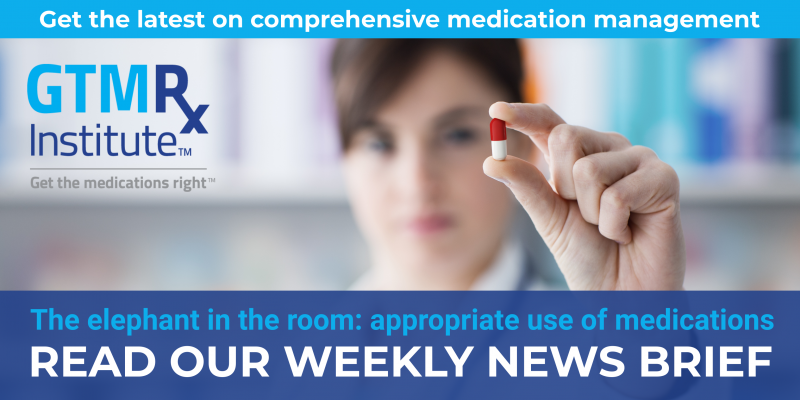Practice Transformation
The most pressing issues related to managing medications isn’t cost; it’s the lack of communication between prescribers and pharmacists, according to a recent Get the Medications Right (GTMRx) Institute survey of health leaders. That by itself is significant, but it points to a larger issue, says GTMRx Executive Director, Katherine Capps: appropriate use of medications. Outside of the opioid crisis, “the tragedy of medication misadventures” is rarely discussed, much less quantified. “How can we manage the over 10,000 drugs available on the market today without re-engineering the process of care toward a systematic, patient-centered and team-based approach?” (Managed Healthcare Executive)
Less than 20% of non-elderly adults who chose not to receive a COVID-19 vaccine and have a health care provider reported receiving information about the vaccines from their providers, according to a new Urban Institute survey. Two-thirds of self-reported eligible adults who did not try to get vaccinated reported having a doctor or health care provider they considered to be their personal provider. Of those adults, 73% reported trusting their providers for information about COVID-19 vaccines, but only 19% had ever received information about the vaccines from their providers (Becker’s Hospital Review; RWJF)
Last week several national employer groups sent letters urging hospitals and ambulatory surgical centers to participate in the Leapfrog Group’s safety grades. “As organizations that speak out for America’s employers, who invest significantly in the health and well-being of employees, we feel that participation in Leapfrog Surveys is vital to achieving real progress towards a safer, higher-quality, more transparent health care system for all,” Ellen Kelsay, president and CEO of Business Group on Health, said in a prepared statement. The participating organizations represent over 12,000 employers with more than 55 million lives. (Fierce Healthcare; announcement)
Evidence & Innovation
Research published in Cancer found that the response to the opioid epidemic has had a negative impact on cancer patients’ ability to manage their pain. Most of the patients interviewed experienced stigma about their opioid use for cancer pain management, and all the patients said the opioid epidemic fostered this stigma. Several struggled to use opioids for pain because of this stigma and the logistical complications they experienced with pharmacies and insurance coverage. Many were afraid to share their concerns about opioids with their providers. (Cure Today; Cancer)
Pharmacists can play a vital role in pharmacogenomics, according to a statement from the American Society of Health-System Pharmacists. It emphasized the importance of pharmacogenomics in improving medication-related outcomes in patient care across all practice settings. These improvements include better selection of appropriate medication therapies, enhanced adherence, decreased length of treatment and improved patient safety. Pharmacists can also work as part of an interdisciplinary team to implement pharmacogenomics into all their practices, and they can educate physicians about the implications to drug therapy and the importance of becoming early adopters. (Pharmacy Times)
Policy Solutions
The Government Accountability Office testified in front of Congress that government CMS should wait for more research before expanding telehealth coverage for Medicare and Medicaid. Some officials from GAO are concerned that there have not been enough studies proving that virtual visits are just as effective as in-person visits. “The long-term effect of these waivers on spending and quality of care is not yet known,” according to the testimony. “In addition, we reported that careful monitoring and oversight is warranted to prevent potential fraud, waste and abuse that can arise from these new waivers.” (BenefitsPro; testimony/report)
Note: sources that have an asterisk require login to view the article.
In Case You Missed It!
Join us for a webinar to hear from two leading experts on ways to implement a buy-right strategy when working with medical carriers, PBMs, etc., and in structuring benefit plan design on the medical and pharmacy side as you pursue value-based care.
Find more information here.
Register here.
This roundtable will be focused on payment, policy and practice reform to support optimized medication use. The event will be held on June 23, 2021 from 2 – 5 pm ET. Speakers to be announced soon.
Interested in sponsorship or attending? Contact Jeff Hanson (e: [email protected]).
Our Employer toolkit, developed by the GTMRx Employer Toolkit Taskforce, explores the benefits of CMM for individuals and for the employers who pay for benefits.
Covers topics, such as:
- What is CMM
- How CMM differs from traditional MTM
- The ROI of CMM in practice
- Patients that benefit the most from CMM services
- CMM & value-based strategies (return-on-investment)
- CMM & Pharmacogenomics testing
- Employer call to action
Find more information on its development and what others are saying in our press release. Find other, employer-related resources.
Download the Employer Toolkit today!
Employers want a healthy, productive workforce. They want to eliminate waste. They want health care that works. They want the investments they make in primary care programs designed to manage chronic conditions and in medication management programs to create value; mitigate risks; and decrease hospitalizations, ER visits and other services that impact total cost of care.
They can make that happen. Read more.
AmazonSmile is an easy way for 0.5% of your qualified purchases go to the GTMRx Foundation at no cost to you. And signing up is simple—go to smile.amazon.com and select “Get the Medications Right Foundation” as your charity of choice. If you prefer to directly donate instead, you can do so here.
Adding the foundation on AmazonSmile will help us continue to provide no cost educational webinars, issue briefs, weekly news briefs and promote the need for transformation of our current system of medication use through social media campaigns.




